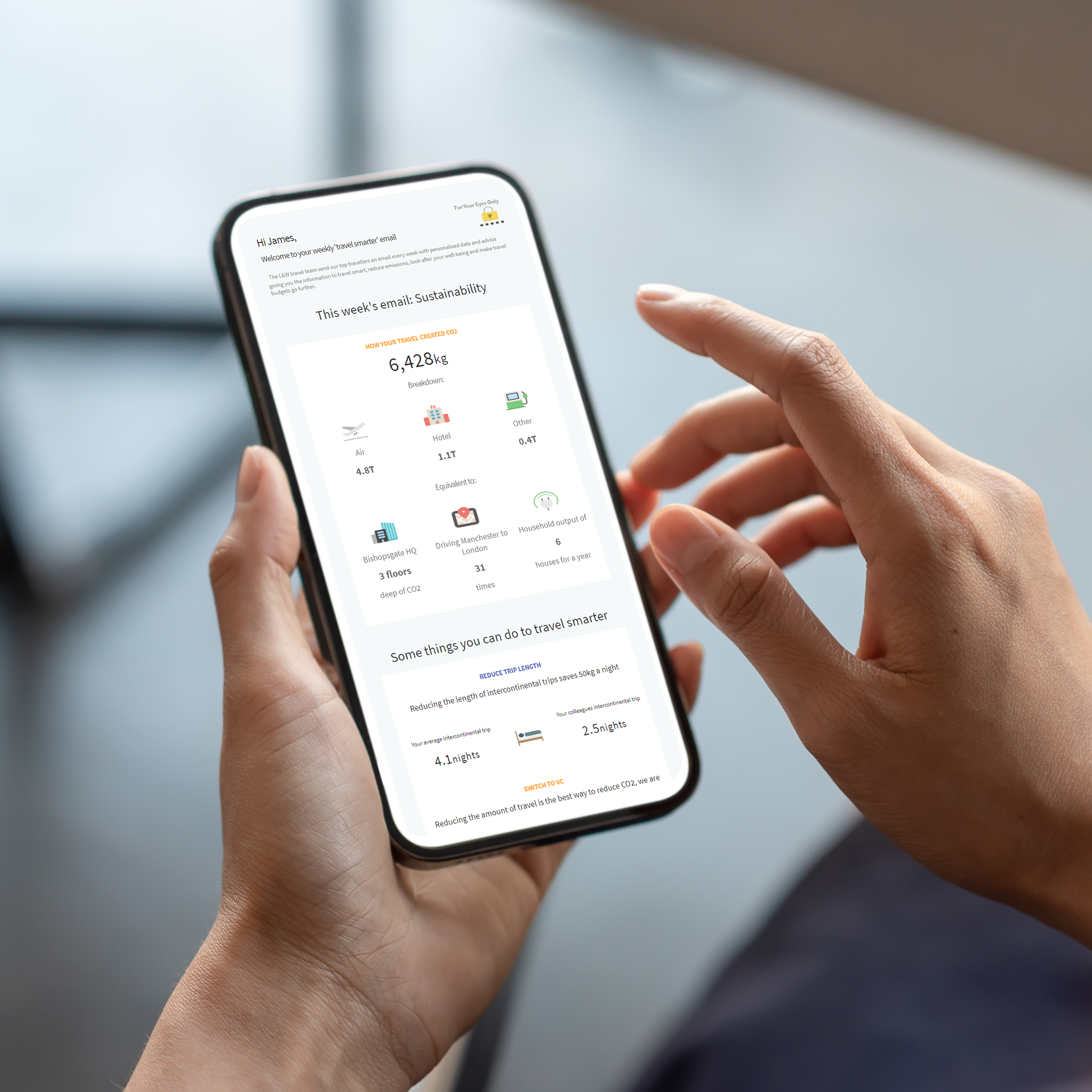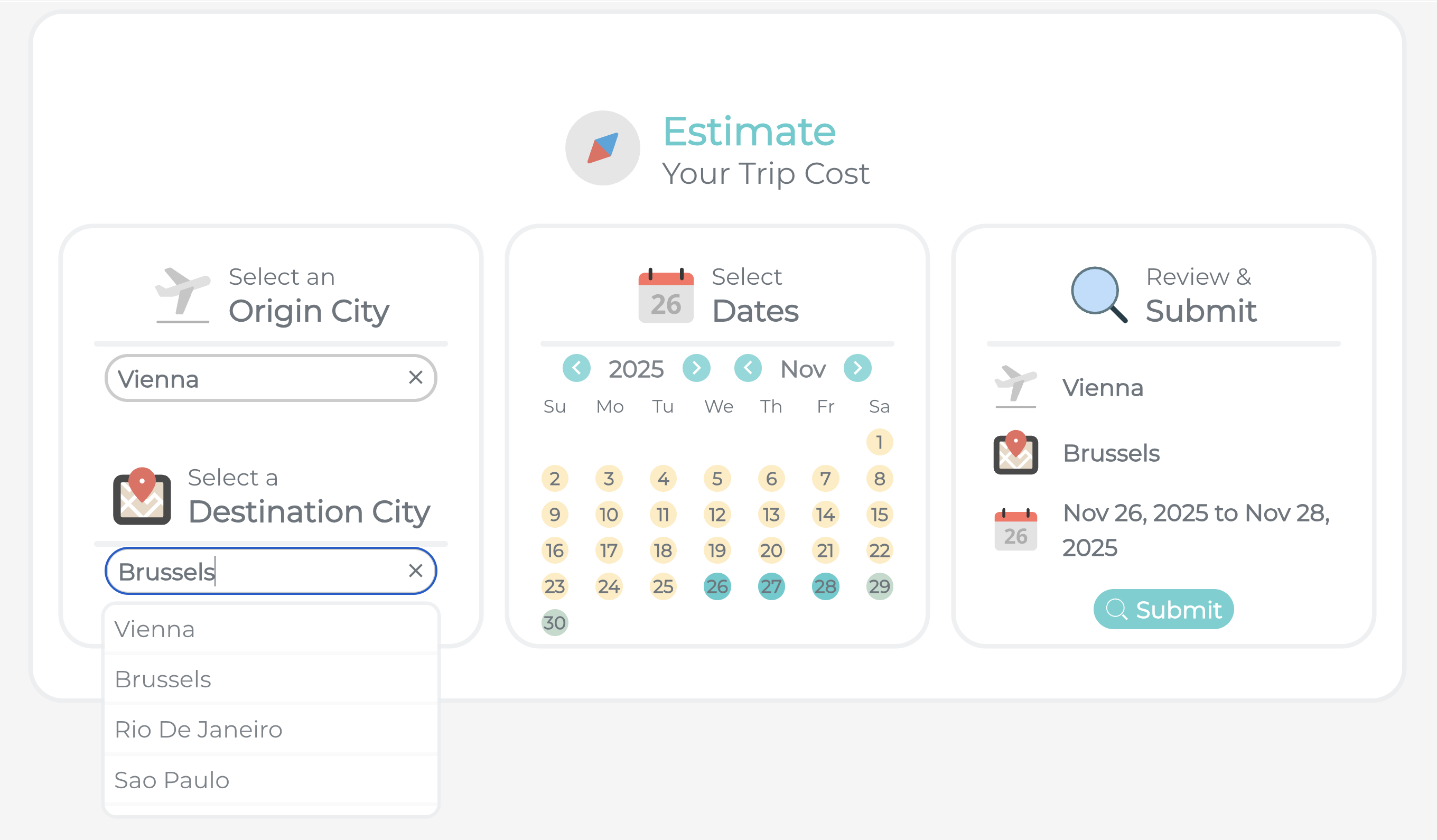Latest Blogs

Reflecting on BTS America 2025:
AI, Innovation and Data Sharing
Last week, our team had the pleasure of exhibiting at the Business Travel Show America (BTSA) in New York. An inspiring and thought-provoking few days and fantastic opportunity to meet more people in the sector.
We enjoyed some really insightful meetings and discussions with people from various organisations around the world, noticing one common theme time and time again, messy and fragmented data.
KPI Of The Month 5
He Gets On Base: A Baseball Lesson for Travel Savings
A personal hobby of Adam, our Director of Client Experience and Product Design, is reading about sports analytics, how we can break down, comprehend, and predict athletic performance using data. Adam says, “I’ve spent too many fall nights using advanced player stats to tweak my fantasy football team. (Surprisingly, I still have a few friends)”.


Data in Action
3 Ways to Make Practical Use of the GBTA Research in Your Organisation
The Global Business Travel Association recently released its forecast showing spending reaching $1.57 trillion in 2025—a 6.6% increase from 2024, with 8.1% growth projected for 2026. But how do you turn this industry insight into a practical strategy for your organisation?
KPI Of The Month #4
High-Value vs Low-Value Travel Classification
When organisations face budget pressure, the immediate instinct is often to implement broad spending
cuts. However, this approach can inadvertently eliminate high-value trips that drive revenue and
growth. We believe the real opportunity lies in strategic elimination rather than
blanket cuts, focusing on "low-value" trips. This not only helps you spend better, not just less, but also supports
your environmental goals by reducing unnecessary Scope 3 emissions.

Why Is This KPI Important?
Reporting Scope 3 carbon emissions for business travel is fundamental for organisations seeking to
manage and reduce their environmental impact. It provides a clear metric for tracking the indirect
emissions generated by employee travel—a category that’s often significant, yet overlooked. This KPI
helps track progress against sustainability targets, benchmark performance, and demonstrate a
commitment to responsible business to clients, investors, and employees.
Increasingly, we’re seeing that the customers of our clients are requesting more detailed emissions
data to support their supply chain reporting and net-zero goals. This is no longer just a “nice to
have”—in many jurisdictions, Scope 3 reporting is now a regulatory and audit requirement. For
example, the EU’s Corporate Sustainability Reporting Directive (CSRD) mandates Scope 3 disclosure
for all large organisations, and similar rules are being implemented or strengthened in the US, UK,
and other major economies. Internal audits and external assurance are becoming standard practice
under these new compliance frameworks.
Strengths of This KPI
Comparative Power: The real strength lies in comparison. This KPI lets you see if
emissions are rising or falling year-on-year, and whether one travel mode (like a flight) is more
carbon-intensive than another (like a train). It’s not about the absolute number, but whether you’re
moving in the right direction.
Industry Standardisation: Most organisations use DEFRA metrics, so you can
reliably
benchmark your data against peers and industry norms. This consistency is invaluable for global
organisations.
Actionable in Many Sectors: For many companies, especially outside heavy
manufacturing, business travel is a major source of emissions. Even so, I remember talking to a
sustainability team once at a manufacturing client. We initially thought our travel emissions
savings were tiny, but they were actually very happy! Why? Because reducing travel emissions by 10%
was far more achievable for them than squeezing another 1% from their factory operations, where
efficiency improvements are incredibly difficult. It really highlights the importance of business
travel as an area for change.
Challenges of This KPI
Difficult to Relate To: “Tonnes of CO2” is an abstract concept. Most people can’t
picture what it
looks like, or what it means for them or the business. It’s like those internet memes about the
difference between a million and a billion, big
numbers just don't compute on an intuitive level.
Limited Context: Without context, it’s hard to judge if a number is “big” or
“small.” The same
figure can feel overwhelming or trivial, depending on your perspective. And honestly, I get turned
off by equivalencies that are also equally difficult to understand. Saying "so many tonnes of CO2 is
equivalent to driving to the moon" doesn't really help me because both concepts are inconceivable.
How does that make it any clearer?
Blunt Instrument: This KPI does one thing well—measuring total emissions—but lacks
nuance. It doesn’t explain why emissions are high or low, or what specific actions will make the
biggest
difference.
Taking It to the Next Level
Make It Personal: Share emissions data widely—business leaders, cost centre owners,
and even individual travellers should see how their decisions affect the company’s carbon footprint.
When people realise it’s not just a “somewhere else” problem, but a “me” problem, engagement
grows.
Layered Communication: Use the “What–So What–Now What” framework:
- What: Here’s your number—maybe it’s two shipping containers of hot dogs worth of CO2.
- So What: That’s X% of your department’s annual target, or enough to power your office for a month.
- Now What: Here’s how you can make a difference—choose rail over air, combine trips, or skip unnecessary travel.
AI Visualisation: Don’t just talk about the numbers—show them. Use AI-generated images to visualise what a tonne of CO2 looks like, or what a million hot dogs really means. It’s a powerful way to make the abstract tangible and spark meaningful conversations.
Should You Use This KPI?
Absolutely—if business travel is a
part of your operations, then you need to measure it.
But remember: you manage what you measure. This KPI is a starting point, not the whole
story.
Use it to drive awareness and action, but supplement it with more nuanced insights and
recommendations. With supply chain partners and customers increasingly demanding this data for their
own reporting, and with audit requirements now in force in many regions, robust Scope 3 travel
emissions data is becoming a business necessity, not just a sustainability nice-to-have.
Rating: 2.5/5
Conclusion
Scope 3 travel emissions reporting is a vital tool for sustainability, but its real value comes from how you communicate and contextualise the numbers. By layering in relatable stories, sharing data widely, and using AI to bring the numbers to life, you help everyone in your organisation see that reducing emissions isn’t just a corporate goal—it’s something each of us can influence, one decision at a time. And as customer, supply chain, and regulatory expectations rise, this KPI is quickly moving from optional to essential.
.png)
A Day in the Life:
A Day in the Life of a Sustainability Analyst at Unlocked Data
Ever wondered what goes on behind the scenes as we help global clients untangle the complexities of travel-related CO2 emissions? Here’s a glimpse into a typical day from one of our sustainability analysts—a role that’s part detective, part data scientist, and part trusted advisor.
What Are Clients Asking For?
Every day starts with new questions from our clients. Increasingly, they want to understand not just how much CO2 their business travel generates, but what they can do about it. For example:
- Should we encourage more rail over air, and what’s the trade-off in terms of travel time & costs versus emissions?
- What’s the true impact of using corporate jets?
- Where should we host our next global event to minimise travel emissions?
It's not just about the numbers anymore—clients want actionable insights and scenario modelling to guide real decisions. They're looking for solutions, not just reports.
Navigating Methodology: One Size Doesn’t Fit All
Flexibility is key. Most clients default to DEFRA for emissions calculations, but even that isn't as
straightforward as it sounds. There are choices to make: include or exclude radiative forcing, how
to treat different travel classes, whether to count "well to tank" fuel emissions, and how to define
short versus long haul. DEFRA is widely used, making it great for benchmarking, but it's not always
the most sophisticated tool for every unique situation.
Some clients bring their own blend of government, third-party, and in-house methodologies. The most
important thing is that whatever approach is used, it’s well-documented, applied consistently, and
fully auditable. That consistency is non-negotiable.
And the differences can be dramatic. We recently modelled the impact for a client comparing EPA and
DEFRA methodologies and found that total emissions could vary by as much as threefold. That’s a huge
swing—one that can affect everything from sustainability targets to critical audit outcomes. It
truly underscores why getting the methodology right and being clear about it is so vital.
Trends on the Horizon
We’re seeing a clear shift: clients are moving from cost-based to distance-based reporting. For air
travel, that’s relatively easy. For ground transport—think taxis—it takes a lot more digging to get
accurate numbers. It's a journey, not a sprint, but the direction is clear.
There’s also a move toward scenario-driven analysis. Clients want to see the impact of specific
policies, like mandating rail for trips under a certain distance, or limiting the use of business
class. And it’s not just about their own reporting anymore: our clients' customers are demanding
more granular data to help with their own supply chain emissions disclosures. This means we’re now
breaking down emissions at the project, location, or even facility level. Talk about getting into
the weeds!
The Data Challenge
Here’s the reality: accurate CO2 reporting lives and dies on data quality. Travel data is messy—refunds, exchanges, cancellations, and the tangle between expense data and travel booking data can all lead to errors. We’ve seen clients accidentally double-count emissions because they didn’t understand the difference between what was paid on a BTA card and what was later expensed. It happens more often than you'd think!
How We Solve It
That’s where our expertise comes in. We’ve developed a suite of workflows and algorithms to clean,
combine, and calculate CO2 from disparate data sources. Our approach isn’t just about crunching
numbers; it’s about understanding trends and ensuring that assumptions are applied consistently, so
the insights are reliable, even when the data isn’t perfect. We make sense of the chaos.
We also help clients model the impact of switching methodologies, so they can see what would happen
if they moved from DEFRA to EPA, or vice versa. This transparency is vital for auditability and
stakeholder trust. No surprises, just clear understanding.
What If We Weren’t Here?
Without our help, clients would face a mountain of work—debating methodologies, wrangling messy
data, and struggling to draw meaningful insights, especially from historic records. The risk of
failed audits or undue scrutiny on travel emissions numbers would be much higher. Imagine the
headaches!
We make CO2 reporting easy: we do the heavy lifting on data, advise on best practices, and ensure
consistency and audit-readiness. In a world where audit requirements are tightening and supply chain
partners are asking tougher questions, that peace of mind is invaluable.
In short: Our days are spent making sense of complexity, turning messy data into actionable
insights, and helping clients not just measure—but manage—their travel emissions. And as
expectations rise, from both regulators and the market, that work has never been more important.
KPI Of The Month #3
Reporting Scope 3 Carbon Emissions for Business Travel
This blog series is designed to help travel managers select the most
impactful KPIs for their corporate travel programs.
At Unlocked Data, we understand that managing travel is more than cost control: it's about
making informed decisions that balance efficiency, sustainability, and employee
well-being.
This month we are looking at the strengths and weeknesses of CO2 reporting.

Why Is This KPI Important?
Reporting Scope 3 carbon emissions for business travel is fundamental for organisations seeking to
manage and reduce their environmental impact. It provides a clear metric for tracking the indirect
emissions generated by employee travel—a category that’s often significant, yet overlooked. This KPI
helps track progress against sustainability targets, benchmark performance, and demonstrate a
commitment to responsible business to clients, investors, and employees.
Increasingly, we’re seeing that the customers of our clients are requesting more detailed emissions
data to support their supply chain reporting and net-zero goals. This is no longer just a “nice to
have”—in many jurisdictions, Scope 3 reporting is now a regulatory and audit requirement. For
example, the EU’s Corporate Sustainability Reporting Directive (CSRD) mandates Scope 3 disclosure
for all large organisations, and similar rules are being implemented or strengthened in the US, UK,
and other major economies. Internal audits and external assurance are becoming standard practice
under these new compliance frameworks.
Strengths of This KPI
Comparative Power: The real strength lies in comparison. This KPI lets you see if
emissions are rising or falling year-on-year, and whether one travel mode (like a flight) is more
carbon-intensive than another (like a train). It’s not about the absolute number, but whether you’re
moving in the right direction.
Industry Standardisation: Most organisations use DEFRA metrics, so you can
reliably
benchmark your data against peers and industry norms. This consistency is invaluable for global
organisations.
Actionable in Many Sectors: For many companies, especially outside heavy
manufacturing, business travel is a major source of emissions. Even so, I remember talking to a
sustainability team once at a manufacturing client. We initially thought our travel emissions
savings were tiny, but they were actually very happy! Why? Because reducing travel emissions by 10%
was far more achievable for them than squeezing another 1% from their factory operations, where
efficiency improvements are incredibly difficult. It really highlights the importance of business
travel as an area for change.
Challenges of This KPI
Difficult to Relate To: “Tonnes of CO2” is an abstract concept. Most people can’t
picture what it
looks like, or what it means for them or the business. It’s like those internet memes about the
difference between a million and a billion, big
numbers just don't compute on an intuitive level.
Limited Context: Without context, it’s hard to judge if a number is “big” or
“small.” The same
figure can feel overwhelming or trivial, depending on your perspective. And honestly, I get turned
off by equivalencies that are also equally difficult to understand. Saying "so many tonnes of CO2 is
equivalent to driving to the moon" doesn't really help me because both concepts are inconceivable.
How does that make it any clearer?
Blunt Instrument: This KPI does one thing well—measuring total emissions—but lacks
nuance. It doesn’t explain why emissions are high or low, or what specific actions will make the
biggest
difference.
Taking It to the Next Level
Make It Personal: Share emissions data widely—business leaders, cost centre owners,
and even individual travellers should see how their decisions affect the company’s carbon footprint.
When people realise it’s not just a “somewhere else” problem, but a “me” problem, engagement
grows.
Layered Communication: Use the “What–So What–Now What” framework:
- What: Here’s your number—maybe it’s two shipping containers of hot dogs worth of CO2.
- So What: That’s X% of your department’s annual target, or enough to power your office for a month.
- Now What: Here’s how you can make a difference—choose rail over air, combine trips, or skip unnecessary travel.
AI Visualisation: Don’t just talk about the numbers—show them. Use AI-generated images to visualise what a tonne of CO2 looks like, or what a million hot dogs really means. It’s a powerful way to make the abstract tangible and spark meaningful conversations.
Should You Use This KPI?
Absolutely—if business travel is a
part of your operations, then you need to measure it.
But remember: you manage what you measure. This KPI is a starting point, not the whole
story.
Use it to drive awareness and action, but supplement it with more nuanced insights and
recommendations. With supply chain partners and customers increasingly demanding this data for their
own reporting, and with audit requirements now in force in many regions, robust Scope 3 travel
emissions data is becoming a business necessity, not just a sustainability nice-to-have.
Rating: 2.5/5
Conclusion
Scope 3 travel emissions reporting is a vital tool for sustainability, but its real value comes from how you communicate and contextualise the numbers. By layering in relatable stories, sharing data widely, and using AI to bring the numbers to life, you help everyone in your organisation see that reducing emissions isn’t just a corporate goal—it’s something each of us can influence, one decision at a time. And as customer, supply chain, and regulatory expectations rise, this KPI is quickly moving from optional to essential.

Travel ROI
The Real ROI of Business Travel: Moving Beyond the Obvious
According to the CWT and the Global Business Travel Association (GBTA) 2025 forecast, business
travel prices were set for a period of "moderation" in 2025, with the dramatic price hikes of
recent years slowing, though overall spending is still projected to rise.
A recurring theme at industry conferences and in conversations with clients is the question:
What’s
the real return on investment (ROI) of business travel? As travel volumes and spending
continue to rise in 2025, it’s clear that companies are more focused than ever on making each
trip count-both in measurable outcomes and less tangible benefits.
Generic ROI
It’s easy to default to a generic ROI formula and look for a direct financial return on every pound or dollar spent. Recent studies show that, for SMBs and mid-sized companies, every dollar spent on business travel can generate an average of $12 in revenue, mainly from new customer acquisition. These numbers are compelling and reassuring but difficult to apply to an individual organization's travel profile. Although C-suite leaders overwhelmingly believe in-person meetings are essential for revenue and customer retention, the real value of travel goes much deeper and is difficult to quantify.
Beyond the Balance Sheet: Why is business travel more than pipelines and sales?
For many of us, business travel is more than just closing deals or generating leads. It’s about the
energy and fresh perspective that comes from stepping out of daily routines, reconnecting with
clients and colleagues, and sparking new ideas. Industry events and conferences, in particular,
offer a unique environment for inspiration and relationship-building elements that are hard to
quantify but crucial for long-term business growth.
Face-to-face time with clients and peers leads to richer conversations, deeper understanding, and
creative thinking that rarely happens over video calls. These shared experiences build trust and
community, laying the groundwork for future opportunities.
Creating and Capturing New Data to prove ROI of business travel!
One of the challenges in proving the ROI of travel is that so much of its value is
intangible.
Traditional reporting can tell you where people went and how much they spent, but it often misses
the “why” and “what came out of it.” That’s why, at Unlocked Data, we believe that sometimes you
must create new data, not just report on what already exists.
Our pre-trip planner tool is designed with this in mind. By providing bookers and travelers with
indicative total costs before a trip, we help organizations plan smarter and set clearer
expectations. However, the real power comes when we start capturing additional data points: the
purpose of each trip, anticipated outcomes, and post-trip reflections on what was achieved.
Imagine asking travelers before they go:
- What is the primary goal of this trip?
- Who do you plan to meet, and what do you hope to accomplish?
- What is the expected financial return of this trip (if any)?
And then, after the trip:
- Did you achieve your stated travel objectives
- Will you achieve your expected return on investment
- Rate the other positive outcomes of the travel (e.g. creativity, relationships, motivation)?
This approach turns travel data into a living
feedback loop, helping businesses not only justify spend, but also learn and improve with every
trip.
The Future of Measuring Travel ROI
As the industry evolves, the conversation around ROI is shifting from pure cost control to value creation. Companies are becoming more strategic, using technology to capture richer data and make smarter decisions about which trips to approve and how to measure their impact. The goal isn’t just to spend less- it’s to spend better, ensuring that every trip delivers meaningful value to the business and its people.
We want to know:
What are your personal expectations for business travel in the remainder of 2025? Are you
anticipating more trips, longer trips, or a different style of travel?
How do you ensure your business trips are seen as valuable and purposeful? Does this change how you
plan or report on your travel?
At Unlocked Data, we’re excited to help our clients lead the way. By combining traditional spend
analytics with creative new data points, we can unlock a fuller picture of the true ROI of
travel-one that includes not just financial returns, but also energy, relationships, inspiration,
and long-term growth.
If you’re ready to rethink how you measure the value of business travel, let’s
start a conversation. Sometimes, the most important data is the data you haven’t captured
yet.
KPI Of The Month #2
Separating Price, Patterns, and Volume in Travel Data
This blog series is designed to help travel managers select the most
impactful KPIs for their corporate travel programs.
At Unlocked Data, we understand that managing travel is more than cost control: it's about
making informed decisions that balance efficiency, sustainability, and employee
well-being.
In this series, we'll explore key metrics across Trip Optimisation, Booking Optimisation and
Traveler Compliance to help you build a smarter, data-driven travel program.

Why Is This KPI Important?
Many of our clients are seeing travel levels rebound-sometimes even exceeding pre-pandemic
expectations. This is a positive sign for business growth and client engagement. With airfares
softening in 2025 after a period of sharp increases, there’s now a clearer window to understand
what’s truly driving changes in your travel spend.
Breaking down your travel data helps you isolate three key drivers:
- Price Increases: Are fares genuinely up, or are you just booking differently?
- Travel Patterns: Has your mix shifted towards business class or long-haul flights?
- Travel Levels: Are certain departments or teams travelling more than before?
By analysing these factors separately, you gain a clearer understanding of what’s driving your travel costs and where you have opportunities to improve efficiency or compliance.
Strengths of This KPI
- Strong Financial Undertones Looking at the impact of price, volume and mix is a typical financial measure for understanding variances. These KPIs take a financial approach to the complex travel data to frame spending increases against the backdrop of demand, fares & travel patterns.
- Identifies savings achieved - As prices & volumes are increasing it can be difficult to identify potential savings achieved by procurement teams. These metrics attempt to isolate these price increases to show savings. Clear benchmarking that showcases price performance against industry trends and averages highlights the strength of the current programme and opportunities for improvement.
- Business Changes - in volatile business landscapes where an organisation is changing is places of travel, or acquiring / disposing or moving into new geographies, these metrics help put these changes into the context of travel
Challenges of This KPI
- Complex Calculation - Untangling the mixture of routes, classes, volumes and benchmarks is an intensive task.
- Pricing - Price changes are driven by a variety of complex economic factors. Price increases above benchmarks can be negatively received, even though the nuances of the circumstances are explainable.
- Organisational Buy-In - Business Leaders can be quick to blame price increases for increase in travel spend, rather than grapple with internal demand and booking patterns.
Taking It to the Next Level
To make this KPI more actionable:
- Focus on Outliers - Use detailed internal and external benchmarking to identify outliers (significant change in mix, price or volumes)
- Focus on controllable outcomes- With a complex KPI suite it can be difficult to identify the 'so-what'. Be clear the two or three specific changes that leaders should consider to bring the spend under control.
Should You Use This KPI?
This is a good KPI for taking a
deep-dive into the changes in your travel programme, rather than an everyday temperature check.
Consider running on an semi-annual basis.
Rating: 4/5
Conclusion
In fast-moving business landscapes and complex travel programmes, putting travel spend into context of organisational changes lends credibility and needed nuance to travel reporting for senior leaders.

AI in travel
How Unlocked Data Uses AI to Transform Corporate Travel Insights
At Unlocked Data, we believe that the key to smarter corporate travel management lies in combining advanced AI technology with in-depth travel expertise. While artificial intelligence (AI) is an effective tool for data analysis, our deep understanding of travel dynamics allows us to provide actionable insights tailored to your business needs. This blog discusses how we leverage AI to empower travel managers, ensure data security, and keep up with industry trends.
Why AI Matters in Corporate Travel
Corporate travel generates a significant amount of data from various sources, including expense
tools, booking platforms, payment transactions, and supplier contracts. AI can help consolidate this
fragmented information, making it possible to identify patterns, detect anomalies, and forecast
trends. For instance, our tools can highlight potential savings opportunities, flag instances of
non-compliance, or predict visa and tax risks associated with frequent international travel.
How We Use AI at Unlocked Data
- Data Matching Across Channels Our AI-powered tools unify data from multiple sources, such as invoices and booking systems, ensuring accuracy and consistency. For example, we use AI to clean up supplier names while excluding sensitive traveler information like names or personal details.
- Anomaly Detection Identifying irregularities, such as unauthorized bookings or duplicate expense claims, is essential for compliance and cost control. Our AI detects these issues early, enabling you to take proactive action.
- Forecasting for Smarter Planning By analyzing historical trends, our forecasting models predict future travel demand and identify potential risks, such as visa or tax compliance issues. This analysis helps businesses allocate budgets effectively while avoiding disruptions.
Where Travel Managers Can Safely Explore AI
For those new to AI, reporting and reconciliation provide a low-risk space to explore its benefits without affecting critical operational tasks such as reservations or bookings. These areas are ideal starting points for automation and insights.
Expertise Meets Technology: Our Point of Difference
Unlocked Data stands out because we believe that technology should enhance human expertise rather than replace it. While many competitors prioritize automation, we combine AI-driven analysis with industry knowledge to provide insights that are practical, actionable, and tailored to your organization's specific needs.
Data Security: Our Commitment
We prioritize data security by keeping personal information separate from automated processes. Sensitive traveler information is not included in AI analysis, while supplier names and financial details are matched securely. Additionally:
- All data is encrypted at every stage of processing.
- We comply with global regulations, such as GDPR.
- We provide transparency, so you always know how your data is being used.
Conclusion
At Unlocked Data, we empower businesses with
smarter travel insights by combining advanced AI capabilities with deep industry expertise, all
while ensuring robust data security protocols. Whether you’re interested in reporting automation or
forecasting tools, we’re here to guide you toward success as you unlock the full potential of your
travel program.
Stay subscribed for more insights into how AI is shaping the future of corporate travel and how
Unlocked Data can help you lead the way.
KPI Of The Month #1
How Many People Are Travelling to HQ?
Welcome to the first blog in our series designed to help travel managers select the most
impactful KPIs for their corporate travel programs.
At Unlocked Data, we understand that managing travel is more than cost control: it's about
making informed decisions that balance efficiency, sustainability, and employee
well-being.
In this series, we'll explore key metrics across Trip Optimisation, Booking Optimisation and
Traveler Compliance to help you build a smarter, data-driven travel program.
.jpg)
Kicking off with a Trip Optimisation KPI:
Why Is This KPI Important?
1. Cost & Carbon Reduction
By analysing this data, businesses can identify opportunities to significantly reduce unnecessary
travel, supporting sustainability goals and reducing costs.
2. Tax & Visa Risks
Excessive travel to HQ may inadvertently trigger tax or visa compliance issues, especially for
international employees. Monitoring this KPI helps mitigate these risks.
Strengths of This KPI
- Easy to Understand for Everyone - This KPI is straightforward: either someone traveled to HQ or they didn't. Its simplicity makes it easy for both travel experts and non-travel stakeholders like HR or finance teams to understand and use in decision-making. Clarity is crucial when working with cross-functional teams who may not have deep expertise in travel management.
- Simple Calculation - It's binary, yes or no, which makes it easy to track across large datasets without ambiguity.
- Good Savings Potential - This KPI often highlights areas where businesses can save money by reducing redundant trips.
- Clear Benchmarking - Another strength of this KPI is that it helps demonstrate what "good" looks like. For example, your organisation may have preferred airline and hotel suppliers servicing the HQ city or even deals with local restaurants. By tracking HQ travel, you can easily identify outliers who are not using approved suppliers or channels, ensuring compliance and maximising cost efficiencies.
Challenges of This KPI
- Grey Areas - Not all trips to HQ are created equal. Some may be for internal meetings, while others could be en route to another location. Without detailed trip reasons, the data can be unclear.
- Negative Perception - Labeling HQ travel as "bad" can overlook its benefits, such as career development, cultural immersion and learning opportunities.
- Organisational Buy-In - Setting targets for HQ travel reduction can be tricky, what is the "right" amount? Also, reductions might be influenced by external factors like organisational changes or one-off projects.
Taking It to the Next Level
To make this KPI more actionable:
- Focus on Outliers - Use HR hierarchy data (e.g., job roles and seniority levels) to identify individuals or teams whose HQ travel stands out from the norm.
- Incorporate Trip Reasons - Tracking trip purposes allows you to differentiate between necessary travel (e.g., leadership meetings) and potentially avoidable trips.
Should You Use This KPI?
At Unlocked Data, we recommend
including one Trip Optimisation KPI in your core suite and this one is a strong contender. It's easy
to understand, simple to calculate and often reveals cost-saving opportunities. While it has
limitations, incorporating additional layers like trip reasons and HR data can make it even more
insightful.
Rating: 4.5/5
Conclusion
Tracking the number of people traveling to HQ is a practical way for businesses to optimise their corporate travel programs. By effectively leveraging this KPI, organisations can reduce costs, minimise carbon footprints, and ensure compliance, all while maintaining a healthy balance between collaboration and efficiency.

Stakeholder Engagement
Winning over stakeholders with smart travel insights
Effectively communicating with senior leadership requires a strategic approach that aligns
with their priorities and the wider company objectives — often focused around areas including
cost efficiency, return on investment, sustainability, and compliance.
At Unlocked Data, our unique data reporting provides the insights needed to make informed
smarter travel decisions and easily communicate this to your senior leadership team. It allows
you to gather the information needed to drive strategic changes and answer their questions,
such as:
Are we getting value for money?
A key area of interest for senior leadership within your organisation will be value for money.
How cost effective is our current travel, how does it compare and what is the value of the
current travel programme?
Our system provides detailed analytics on flight and hotel spending against industry
benchmarks,
using a RAG (Red, Amber, Green) rating system to highlight cost efficiencies and areas for
improvement. This allows you to quickly assess the value for money and how cost-effective
certain areas are and to share strategic insights for future expenditure.
Is my team doing the right thing?
Our dashboard helps you to share insights and quickly communicate how travel decisions are
currently being made and to identify any potential areas for improvement.
Analysing a range of compliance metrics, our system will review your travel data
across
the team and provide an overview across the year offering a rating against the standard
benchmark, and identify savings opportunities.
Do we travel too much?
Does the travel current program align with the strategic direction of the business?
Stakeholders
will want to ensure teams are travelling enough to remain effective, sales are optimised, and
business is operating efficiently.
Our reporting tools can differentiate between billable and non-billable time, front office and
back office, internal and external travel data and provide insights into the overall return on
investment for your organisation.
Having this information to hand and assessing it allows you to communicate effectively with
leadership and answer the questions of whether the current level of travel is efficient. This
can help refine travel policies to maximise efficiency and profitability within the
organisation.
How sustainable is it?
Sustainability is an increasing priority for many organisations. At Unlocked Data, we can
provide you with the tools and information syou need to review how sustainable your travel
currently is and make smarter, greener decisions moving forward. You can then use this data to
communicate at a strategic level with senior management to bring sustainability to the
forefront
of the conversation.
By leveraging our reporting
dashboard and advanced insights, you can communicate with
stakeholders confidently, offering facts and figures alongside actionable insights that drive
smarter travel decisions.
For more information on how our system can support your business objectives, get in touch and let’s book a quick demo!
ISO 27001 Certification
What is ISO27001 certification and why does it matter?
We’re delighted that in 2024, we received our ISO270001 accreditation, allowing our clients to feel even more safe and secure when working with us. In today’s digital world, data security is more important than ever before, but what is ISO27001 accreditation and what does this mean for our clients?

What is ISO27001?
ISO27001 is a globally acknowledged certification that sets out the best practices for managing
and securing sensitive information. It provides a systematic approach to risk management,
ensuring that organisations identify, assess, and mitigate security threats effectively.
When working with our clients, we are often processing sensitive travel data including personal
and financial information. Therefore, it was important to us that we were compliant with the
international standards and ISO27001 certified.
In order to be certified, we were required to undergo rigorous assessment by independent
auditors, validating our commitment to maintaining the highest standards of data security for
you.
How Does This Benefit You?
- Enhanced Data Security – Your sensitive information is protected by a robust security framework, minimising the risk of expensive data breaches.
- Regulatory Compliance – ISO27001 aligns with legal and regulatory requirements, giving you peace of mind that your data is handled responsibly and in line with the guidelines.
- Addressing weaknesses – Through being more risk aware, we can quickly be more risk aware and recognise when potential weaknesses exist in your data handling process – correcting them before they become problematic.
- Greater Trust & Confidence – By achieving this accreditation, we demonstrate that we are committed to safeguarding your data and Unlocked Data take this really seriously.
Achieving ISO27001 is not just about gaining a certification—it reflects our ongoing commitment to continuously improving our service to our clients and ensuring your travel data is handled with care. We will continue to implement best practices and ensure that our clients' data always remains protected whilst it is used to produce reports that inform smarter, more efficient travel decisions.
By choosing to work with us, you can be confident that your information is in safe hands. If you’d like to learn more about how we can use your travel data to produce insights, reports and key information to make decisions, get in touch!
Reflections on 2024 achievements
Our mission continues
As we reflect on 2024, the concept of 'growing gracefully' perfectly captures Unlocked
Data's
journey. This year has been transformative for us, marked by significant milestones:
welcoming a
multitude of new clients to our expanding universe and growing our talented team!
Achieving ISO27001 certification is a testament to our team's dedication and our
clients' trust. Your support has been the fuel propelling us forward, so thank you for being
part of this incredible journey.
Here's to another year of unlocking potential and growing together. Our mission continues!
🚀
Exciting Plans Ahead
Where to find us in 2025
It's the new year and lots of exciting plans for 2025 are in full swing! 📆 We can't wait to connect with more of you and work with more businesses to help them develop smarter travel strategies this year! We are planning to attend a number of events around the world 🌍 and hope to see you there, which conferences are you planning to visit this year?